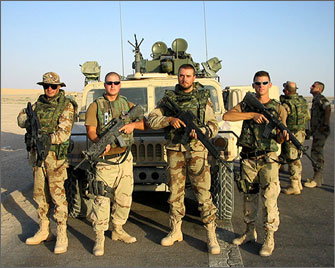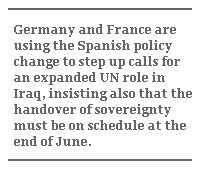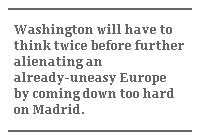Hit by Spanish Withdrawal Syndrome
Hit by Spanish Withdrawal Syndrome

BRUSSELS: Despite his promise to pull Spain's 1,300 soldiers out of Iraq, the newly elected Spanish Prime Minister Jose Luis Rodriguez Zapatero had left open the slim possibility of a rethink. If the United Nations were to be granted a new mandate to control security in the country, Zapatero said, his government might review that pullout decision. On April 19, however, Zapatero suddenly put an end to that possibility by ordering his troops home "as soon as possible." With European governments and public opinion increasingly critical of Washington's heavy-handed policies in post-Saddam Iraq, the Spanish move has renewed concerns about the growing trouble in transatlantic relations.
Spain's policy shift is a major setback for US efforts to secure more European soldiers and funds, with NATO members France and Germany, which opposed the Iraq war, now expected to become even more reluctant to help. Honduras and the Dominican Republic have already joined Spain in calling back their troops home from Iraq, signaling that Madrid may have struck a heavy blow to Washington's efforts to keep a united allied front in Iraq by sparking a fresh re-think among coalition members.

Despite recent American promises to grant the United Nations a central role in Iraq, many in Europe fear that the world body will not be given full authority over Iraqi security. As such, they are particularly sensitive to Spain's argument that it is calling back its troops earlier than planned because the UN is unlikely to secure a sufficiently strong mandate in Iraq.
Madrid's decision is being taken especially seriously because of the strong reputation of one of the main architects of the withdrawal, Spain's new foreign minister Miguel Moratinos. Before joining Zapatero's government, Moratinos spent four years as the EU's special representative in the Middle East.

European Commission President Romano Prodi has in fact praised Spain's decision to bring back its soldiers. Madrid "has now returned to our position," Prodi told a meeting of centre-left Italian opposition parties which are critical of Rome's participation in the Iraq occupation. "The divide that prevented Europe from having a common position is being sorted out," said Prodi. Meanwhile, EU foreign policy supremo, Javier Solana, himself a former Spanish Socialist party foreign minister, has warned that adoption of a new Security Council resolution giving the UN a strong and growing role in Iraq is "crucial" if the EU is to become collectively engaged in the country.
Germany and France are also using the Spanish policy change to step up calls for an expanded UN role in Iraq, insisting also that the handover of sovereignty must be on schedule at the end of June. "Given Iraq's ever faster spiral of violence our view is that the only solution is a political solution," said French Foreign Minister Michel Barnier after recent talks with his German counterpart Joschka Fischer. For his part, Fischer insisted that it was "more vital than ever that the transfer of sovereignty takes place according to the timetable."

Equally troubling for Washington is the danger that Spain's policy reversal could spark a domino effect, with other nations also reconsidering their troop commitments. Other European governments with troops in Iraq are standing firm - at least for the moment. But dissension is rising especially in coalition countries like Italy, Norway, and Portugal, where public opinion continues to oppose troop deployment in Iraq. With the situation in the country deteriorating fast, there is a growing European view that "the Iraq war was a terrible mistake," says Michael Emerson at the Brussels-based Centre for European Policy Studies. As such, others in the coalition, especially Italy, may be tempted to follow Zapatero, he says.
Meanwhile the transatlantic divide over Iraq appears to be widening further. Few in Europe share U.S. President George W. Bush's warning that Madrid's troops withdrawal will give "false comfort to terrorists or enemies of freedom in Iraq." Recent opinion polls in Spain show that the move has the firm backing of over 72 per cent of the population and of all parliamentary parties, apart from the defeated conservatives who sent the soldiers to Iraq in the first place. Indeed, most have welcomed the return of a Spanish foreign policy based on the rule of international law.

"American allegations that Zapatero is engaged in an appeasement of terrorists do not apply," says an EU diplomat in Brussels, adding: "The Spanish leader is only keeping an election pledge he made much before the March 11 terror attacks in Madrid." Spain has in fact been just as forceful in rejecting Osama Bin Laden's truce offer as other EU states. "The accusation that (Spain) has caved in is emphatically not shared by us," says German government spokesman Walter Lindner. Adds Spain's leading newspaper El Pais: "Zapatero has acted in a clear and expedient fashion. His message is unequivocal. The Zapatero government has begun by keeping to its word."
Despite American charges, Zapatero's government is expected to be even tougher on fighting terrorism than its predecessor, argues John Palmer of the European Policy Centre. "Americans are misreading Zapatero," he says, adding that like many others in Europe, Zapatero is making a clear distinction between the combat against terrorism and the unpopular Iraq war.
Reflecting this view, the European Commission chief has said repeatedly that far from making the world a safer place, the strife in Iraq is worsening global security. "The Iraq war has not helped to improve things," Prodi said recently, adding that being against the Iraq war did not mean that governments were less determined to root out terror. Although Zapatero is pulling out soldiers from Iraq, the new government in Madrid remains "fully engaged in the fight against terrorism (and) the stability of Iraq," added Solana.
While noting that Senator John Kerry, the presumptive Democratic nominee for president, has also deplored Spain's move, officials in Madrid play down fears that the Iraq withdrawal will have a long-term impact on relations with the US. Moratinos has argued that since Washington champions democracy, it will understand that governments must honor their pre-election promises. The Spanish Foreign Minister, who is in Washington this week to try to mend fences with the Bush administration, has also said he is confident the friendship with America will not be harmed in the long-term.
Others are not so sure, however. El Pais admitted that Zapatero's decision had created a "problem of Spanish image in the US that will be difficult to manage." But the newspaper also reported that Spain's close alliance with Washington had yielded little in terms of lucrative contracts in Iraq for Spanish firms or brought other diplomatic benefits. Crucially, Madrid has been careful to balance its tough talk on Iraq with a promise to provide non-military assistance to Iraq such as training police offers and said it will double the number of soldiers in Afghanistan where the UN has a clear mandate.
Most Spanish officials are convinced that as the going gets even tougher in Iraq, Washington will have to think twice before further alienating an already-uneasy Europe by coming down too hard on Madrid.
Shada Islam is a Brussels-based journalist specializing in EU trade policy and Europe’s relations with Asia, Africa, and the Middle East.